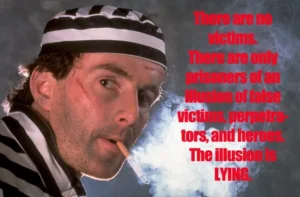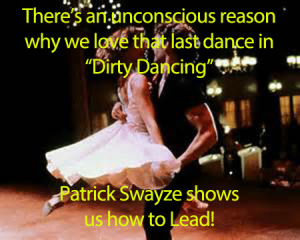By Cathy Eck
Here are the links for Part I and Part II of this series.
Crime is Illusory
Red did commit a crime. But through his relationship with Andy, he changes. He starts to accept liberation as possible. Crimes only exist in the illusion because people hide their beliefs and emotions. They project their enemies outside of them.
The way to free ourselves from prison is to drop the beliefs that got us into prison. We liberate the mind, then we go free. The physical follows the mental. When the illusion completely disappears, everyone returns to innocence. Everything is forgiven, which means it went back in time to “before the giving.”
Eventually, Red gets parole. He gets it when he stops trying. He admits, in his last parole interview, that he doesn’t even know what rehabilitation is anymore. Admitting that we just don’t know is powerful because we’re admitting that the false self doesn’t have the answer. That allows the True Self to take over and do its magic.
Red: I know what you think it means, sonny. To me it’s just a made up word; a politician’s word. So young fellas like yourself can wear a suit, and tie, and have a job. What do you really want to know? Am I sorry for what I did?
Parole official: Well, are you?
Red: There’s not a day goes by I don’t feel regret. Not because I’m in here, or because you think I should. I look back on the way I was then, a young, stupid kid who committed that terrible crime. I want to talk to him. I want to try and talk some sense to him, tell him the way things are. But I can’t. That kid’s long gone and this old man is all that’s left. I got to live with that. Rehabilitated? It’s just a bullshit word. So you go on and stamp your form, sonny, and stop wasting my time. Because to tell you the truth, I don’t give a shit.
Andy Knows His Strengths
Andy brings his natural strengths into the prison — his insight, his out-of-the-box creativity, and his fearlessness in risk taking. Often people feel that their gifts are too weird or will be judged so they put their True Self aside or hide it in the closet. They become small. But when we bring our True Self’s gifts into the illusion, we see the exits. Our True Self is our power; it can even dissolve the illusion when we allow it to shine.
Notice that even though Andy’s gifts cause him to rise to the top of the prison food chain. He doesn’t start thinking he’s someone special. He keeps his eye focused on the goal — freedom.
Brooks isn’t as wise. He feels important in his prison role as librarian. He even tries to harm another so he can stay in Shawshank. When he does get out, he commits suicide. He’s no one in the free world.
Andy Gives What He Wants to Others
When Andy succeeds in getting through to the guards on the rooftop, he gives his well-earned beers to the other inmates. You can see by the smirk on his face that he didn’t do it for their friendship or loyalty. He did it to plant the seed of freedom. The library, teaching other inmates to read, and the infamous music broadcast are all ways he created freedom within the illusion.
These actions were slowly liberating Andy’s mind so that when he eventually got outside those concrete walls, he was truly free. He too is nobody on the outside, and he doesn’t care. He’s joyful in sanding his boat.
Act IV
The three-act story is normal. We’re used to it. Most screenwriters would have ended the movie with Andy standing in the water, a free man. But Shawshank gives us a gift — a fourth act. I always imagine life having a fourth act. It seems ridiculous that we work so hard to get free and then we die. The best part of life is after our rebirth, and it should last a very long time so we can enjoy the fruits of our labor.
Andy and Red have formed a sort of bromance — they have an honest firendship and we want them both to be free. Now we get to see that unfold.
Andy: [in a letter to Red] Dear Red. If you’re reading this, you’ve gotten out. And if you’ve come this far, maybe you’re willing to come a little further. You remember the name of the town, don’t you?
Red: Zihuatanejo.
Andy: I could use a good man to help me get my project on wheels. I’ll keep an eye out for you and the chessboard ready. Remember, Red, hope is a good thing, maybe the best of things, and no good thing ever dies. I will be hoping that this letter finds you, and finds you well. Your friend. Andy.
Red decides to break his parole. He chooses to join Andy.
Red: I find I’m so excited, I can barely sit still or hold a thought in my head. I think it’s the excitement only a free man can feel, a free man at the start of a long journey whose conclusion is uncertain. I hope I can make it across the border. I hope to see my friend and shake his hand. I hope the Pacific is as blue as it has been in my dreams. I hope.
I live near the Pacific. I suspect that they say it has no memory because America was settled from the east. People came for freedom, but unfortunately they brought their beliefs with them. They didn’t realize they could just let go.
Andy: You know what the Mexicans say about the Pacific?
Red: No.
Andy: They say it has no memory. That’s where I want to live the rest of my life. A warm place with no memory.


